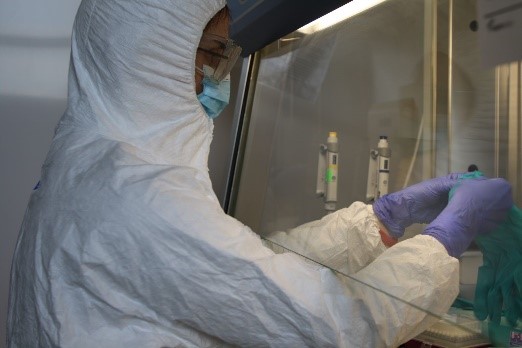YOUR BROWSER IS OUT-OF-DATE.
We have detected that you are using an outdated browser. Our service may not work properly for you. We recommend upgrading or switching to another browser.
Date: 16.04.2020 Category: general news, science/research/innovation
A SARS CoV-2 virus identification test system and medical thermovision tests are being developed by scientists from the Department of Biomedical Engineering, thus contributing to the aid provided to the health care system during the ongoing epidemic.
 Magdalena Przybyło PhD has been working at the Research and Development Centre of the Regional Specialist Hospital in Wrocław (headed by Professor Wojciech Witkiewicz, an honorary doctor of WUST ) on a system of tests identifying the presence of the SARS-CoV-2 virus.
Magdalena Przybyło PhD has been working at the Research and Development Centre of the Regional Specialist Hospital in Wrocław (headed by Professor Wojciech Witkiewicz, an honorary doctor of WUST ) on a system of tests identifying the presence of the SARS-CoV-2 virus.
- Due to the wide disparity in existing protocols, this required the development of sample taking, storage, isolation, analysis procedures. To ensure the hospital’s smooth operation, a relatively quick diagnosis is necessary, which is why Dr Przybyło’s actions are revolutionary. The development of the new procedures can probably be considered ground-breaking, and the research is very much needed - says Professor Halina Podbielska, Head of WUST’s Department of Biomedical Engineering.
The first analyses started at the weekend of April 4-5. The Real-Time PCR (Reverse Transcription Polymerase Chain Reaction) tests applied by Magdalena Przybyło PhD are some of the most sensitive methods of detecting small amounts of RNA molecules in a sample. This allows the ribonucleic acid (RNA) of the SARS-CoV-2 virus to be tested quite quickly, which leads to the identification of an active infection.
The first tests were successful, which will allow the centre to analyse 100 samples per day. It is planned that after the facility has gained experience in testing, it will test 200 samples and as many as 1,500 samples per day in the long term. The test development and analysis will require the staff to isolate the virus so that it is not unintentionally carried out the facility.
- Work at the centre is a challenge for enthusiasts who have the right biomedical engineering knowledge and education and want to gain additional unique experience. I know that our students of Biomedical Engineering, who have already completed relevant courses at the university, are very keen to contribute to this research as volunteers. Already in the course of work, ideas for joint grants are being developed in fields including the production of putty/reagents or quick diagnostics based on solutions using incremental technologies, i.e. fast production technology based on 3D printing - explains Professor Halina Podbielska.
Another group of scientists from the Department of Biomedical Engineering has started cooperation with the Lower Silesian Centre for Oncology. The group is sharing its experience in the field of medical thermal imaging research. A biometric system is to be developed to analyse the body temperature of the Centre's employees.
- Currently, work is being carried out on fast temperature measurement. The first measurements were launched last weekend, and since Monday, Tomasz Kuncewicz, an employee of the department, together with the centre’s staff, has been building a database, i.e. registering thermal images of the employees as well as digital photos. As a result, it will be possible to develop a system for identifying people with elevated temperature - says Professor Halina Podbielska.
- Thanks to our cooperation with WUST, we set up two thermal imagers: one in front of the radiation therapy unit and one at the lock used by the employees. The cameras scan body temperature in real-time and indicate if an infection is present or if an employee is healthy - explains Marzena Janiszewska, MD, PhD, Head of the Division of Medical Physics of the Lower Silesian Centre for Oncology and regional consultant for medical physics.
Our site uses cookies. By continuing to browse the site you agree to our use of cookies in accordance with current browser settings. You can change at any time.